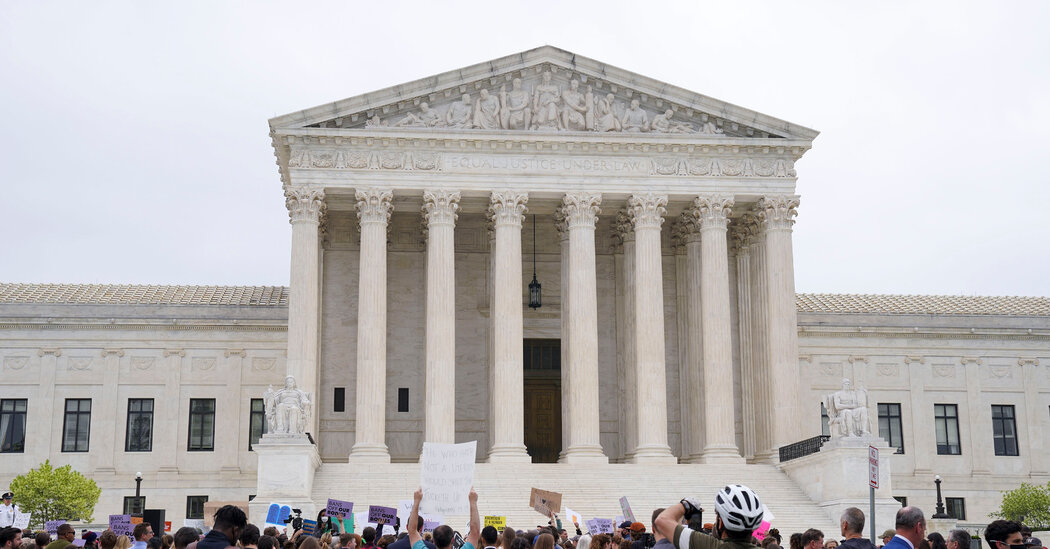Democrats who were privately hoping for a surprise development to shake up the midterms have gotten their wish. Nobody expected it to come in the form
Democrats who were privately hoping for a surprise development to shake up the midterms have gotten their wish. Nobody expected it to come in the form of a leaked draft Supreme Court opinion overturning Roe v. Wade, however.
It’s a political bombshell. But that doesn’t mean it’s easy to discern where the shrapnel lands.
Democrats we spoke with on Tuesday were furious about Justice Samuel Alito’s draft opinion, which was presented in the document as the view of the court’s conservative majority. Universally, these Democrats viewed it as an assault on the fundamental rights of women to control their own bodies.
But in coldly rational political terms, they expect the news to energize their base and motivate key swing groups, such as suburban college-educated women. They also pointed to polling showing that banning abortion, as a number of states have indicated they would do if Roe were overturned, would be unpopular with the broader public.
“The more you see Republicans cheering the decision, the more you’re going to have voters saying, ‘Wait a second, this is not what I thought they were going to do,’” said Margie Omero, a Democratic pollster.
“We hold that Roe and Casey must be overruled,” Alito wrote in the draft, which a representative for the court emphasized in a statement was not necessarily a final opinion. “It is time to heed the Constitution and return the issue of abortion to the people’s elected representatives.”
Omero pointed to an April 26 polling memo by Navigator, a Democratic messaging group she is involved with, arguing that a Supreme Court ruling along these lines “would motivate Democrats and pro-choice Americans significantly more to turn out in 2022 than Republicans and those who are pro-life.”
Now that Roe’s elimination is no longer hypothetical, Omero said, she expects voters will begin paying more attention to the issue. “We’re going to have a decision that is going to lay bare the differences between the parties,” she said.
What Republicans are saying
So far, top Republicans would rather talk about the leak itself than the potential decision’s political implications.
Senator Mitch McConnell, the minority leader, called the disclosure “an attack on the independence of the Supreme Court.” It was “a judicial insurrection,” said Gov. Ron DeSantis of Florida. “An act of institutional sabotage,” said Senator Ben Sasse of Nebraska.
“They’re always unsure how to talk about abortion,” said Rachel Bovard, a senior director of policy at the Conservative Partnership Institute, a right-leaning think tank. Bovard said she had spent the past day discussing the implications of the leak with nervous Republican lawmakers and aides.
Privately, Republicans are still trying to gauge how the issue will affect the midterms. On Tuesday, the National Republican Senatorial Committee sent a memo urging candidates to “be the compassionate consensus-builder” on abortion, while also highlighting what Republicans say are extreme views among Democrats.
Indicating some concern about how Democrats and activists on the left might try to portray Alito’s draft opinion, the memo also recommended that G.O.P. candidates “forcefully refute” statements by Democrats that Republicans want to ban contraception and “throw doctors and women in jail.”
Several G.O.P. operatives said that the issue could ultimately play to Republicans’ advantage if the debate becomes about whether to enact restrictions on the timing of abortions rather than about whether there ought to be a federal right in the first place.
“Running on overturning Roe is not a winning issue” in a general election, said Garrett Ventry, a Republican political consultant. “Late-term abortion is.”
Other Republicans expressed skepticism that abortion, rather than inflation or crime, would move many voters in November.
“The battle lines on this issue have been drawn for a long time,” said Sean Spicer, a former press secretary for the Trump White House and Republican National Committee strategist.
But the decision is likely to affect how candidates, donors and activists approach the political fights ahead of them, funneling millions of dollars into Senate and state-level races that could determine the shape of the post-Roe world.
“If you’re running for Senate, you are tied to the national ideological debate,” said Kristin Davison, a Republican consultant involved in midterm races across the country. Running for governor is more complicated, she added, because “now you have to do something about it.”
For social conservatives who have waited decades to overturn Roe, the fight is just beginning.
“There’s no doubt the battle goes to the state level,” said Bob Vander Plaats, a Christian conservative leader in Iowa, who added that the next focus for the anti-abortion movement would be pushing across the country for laws on fetal cardiac activity. “It’s not a political issue. It’s a right or wrong issue.”
What to read
— Blake & Leah
Is there anything you think we’re missing? Anything you want to see more of? We’d love to hear from you. Email us at [email protected].
www.nytimes.com
